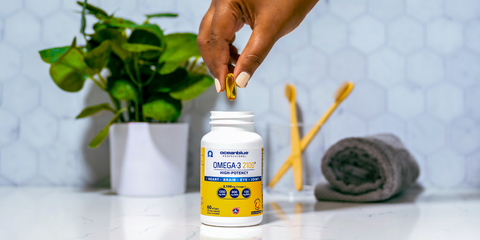
Our Picks for Supplementing Omega-3s
The supplement *space* can be a dense, confusing ecosystem. And with new brands emerging left and right, it can be hard to parse the clinical facts from the marketing jargon. With that said, we’re OceanBlue, and we’re Omega-3 experts. We don’t find ourselves needing seductive marketing jargon, because our products speak for themselves. In today’s market, you’ll typically find a divide between quality Omega-3 formulas on the one hand, and affordable ones on the other. Rarely do the two intersect—but with OceanBlue, they do. We understand that a lasting, wide-reaching impact depends upon both of those variables working together at once, and it’s always been our goal to uplift the long-term health of as many people as possible.
Whether you have rigorous health goals, you’re trying to support your joints as you age, or your fast-paced lifestyle needs a leg up, there’s an OceanBlue formula to suit your needs. These are our best-sellers:
1. OceanBlue Omega-3 2100: Why mess with the classics? Our flagship product beholds the highest potency & purity for 360 degrees of health.
2. OceanBlue Omega-3 1300 Vegan: All of the benefits, none of the fish. Our proprietary algae promises concentrated, EPA-forward support.
3. OceanBlue Omega-3 2100 w/ CoQ10: Take it to heart: this formula supports comprehensive heart health and cellular energy production.
4. OceanBlue Everyday Omega Minis: Heart, brain immune and full-body support that’s stupidly easy to swallow.
5. OceanBlue Brain Fuel: Feeling scatterbrained? This formula helps replenish the building blocks needed for a perky, healthy brain.
What Are Omega-3s? (The Deep Dive)
So we touched on this up top, but being that you’re a curious, critical thinker, we’re going to give you the deep version. Omega-3s are a type of polyunsaturated fatty acid (PUFA) that our bodies need for various functions, including heart health, brain health, and joint health. EPA (eicosapentaenoic acid), DHA (docosahexaenoic acid), and ALA (alpha-linolenic acid) are three different types of omega-3 essential fatty acids.
- ALA: the most common omega-3 fatty acid found in the diet, it’s primarily sourced from plant-based foods like flaxseeds, chia seeds, hemp seeds, and walnuts. While ALA is an essential fatty acid, the body has limited ability to convert it into EPA and DHA.
- EPA: a long-chain Omega-3 fatty acid primarily found in fatty fish like salmon, mackerel, and sardines. It’s known for its inflammation regulation properties and has been associated with cardiovascular health benefits. Our aforementioned Omega-3 Vegan formula is also EPA-rich—unlike other vegan Omega-3 formulas, if we may be so brazen. Omega-3 1300 Vegan also happened to win Nutra’s ‘Product of the year’ award in 2023, so there’s that.
- DHA: another long-chain Omega-3 essential fatty acid commonly found in fatty fish. This guy is particularly important for brain health and development, and plays a crucial role in supporting cognitive function, eye health, and overall nervous system function.
While all three Omega-3 essential fatty acids produce health benefits, preformed EPA and DHA are considered more biologically active and readily usable by the body. Consuming sources of EPA and DHA directly—we’re talking seafood and Omega-3 supplements—is often recommended to ensure adequate intake of these specific Omega-3s. While ALA is an essential fatty acid, the body has limited ability to convert it into EPA and DHA.
It's important to note that the optimal balance of these Omega-3 essential fatty acids is absolutely going to vary depending on your individual needs. Consulting with a healthcare professional or registered dietitian can provide personalized guidance on incorporating Omega-3 fatty acids into your diet.
Why Do Omega-3s Matter?

Omega-3s are essential for maintaining good health. They play a crucial role in inflammation regulation, and supporting brain function and heart health. Omega-3s are also critical during pregnancy, nourishing the health of both mother and baby and ensuring baby’s proper brain development. In short? Essential rhymes with potential. Omega-3s help you reach yours.
Benefits of Omega-3s
- Heart Health
- Blood Pressure
- Brain Health
- Eye Health
- Joint Health
Heart Health
Omega-3s have been shown to have numerous benefits for heart health. They’re known to positively influence blood pressure and triglyceride levels, both of which are risk factors for heart disease when high. Studies have shown that consuming Omega-3 supplements can reduce the risk of heart attacks, strokes, and sudden death in people with heart disease. Omega-3s can also improve the function of the endothelium, which is the lining of blood vessels, improving blood flow and preventing the formation of blood clots.
Blood Pressure
Omega-3s have been shown to help reduce blood pressure levels in people with, well, high blood pressure. This effect is likely due to their ability to regulate inflammation, which can help reduce stiffness in blood vessels and improve blood flow.
Brain Health
We’re not saying you’ll ascend to Einstein status overnight, but Omega-3s are essential for proper brain function and development. Studies have shown that EPA and DHA can help improve mood, reduce symptoms of depression and anxiety, and improve cognitive function in older adults. DHA is particularly important during fetal and early childhood development, as it plays a crucial role in the development of the brain and nervous system. One Omega-3 study that examined forty older adults found that increased omega-3 levels were associated with better memory, processing speed & structural brain measures.
Eye Health
Not a dry eye in the house! One study showed that Omega-3 supplementation helped to improve dry eye symptoms for 1,255 patients with glaucoma. Omega-3s may also help reduce the risk of age-related eye degeneration, a leading cause of vision loss in older adults.
Joint Health
Omega-3s have the ability to regulate inflammation, making them a useful supplement for people with joint pain and stiffness. Studies have shown that Omega-3 supplements can help to positively impact inflammatory response, and reduce the need for medication in people with rheumatoid arthritis.
Sources of Omega-3s
Like we were saying earlier, there are both plant and animal sources of Omega-3s—all with different nutrient profiles and with varying degrees of potency. The most significant sources of Omega-3s are:
Supplements
We’re giving it to you straight: Supplements are the most convenient and reliable way to ensure you’re getting enough Omega-3 in your diet—as opposed to eating seafood twice a week and hoping for the best. As it happens, all OceanBlue formulas are third-party tested for purity, potency, and freshness, so you can feel confident about adding them to your routine.
Fatty Fish
The American Heart Association recommends consuming at least two servings of fatty fish per week. Fatty fish like salmon, mackerel, and sardines are the best sources of EPA and DHA—but you have to consume about 6-8oz to get a decent amount of Omega-3s. You’d probably have to plow through 3 or 4 spicy tuna rolls to get the omega-3s in a single OceanBlue softgel. Nuts and Seeds Nuts and seeds like chia seeds, flaxseeds, and walnuts contain ALA, which your body can convert into EPA and DHA. However, the conversion rate is low, so we wholeheartedly implore you to also include EPA and DHA sources in your diet, please and thank you.
Plant Oils
Plant oils such as flaxseed oil, soybean oil, and canola oil contain ALA, which your body can technically convert into EPA and DHA. However! This conversion process is not very efficient, so it is recommended to consume EPA and DHA directly through food or supplements. Moreover, these oils are considered seed oils, known to be high in omega-6 fats. Small amounts of omega-6 fats are needed in your diet, but higher levels are connected with inflammation in the body, which has been linked to a variety of health conditions. Instead, opt to cook with heart-healthy oils like olive oil, coconut oil, and ghee, which are all high in antioxidants.
Recommended Dosage of Daily Omega-3s
Because your needs are different to hers, and hers are different to his, the recommended daily intake of Omega-3s varies by age and gender. Platitudes about how we are all unique aside, we’re going to go ahead and remind you that 500mg is the daily amount of Omega-3 intake consistent with nationwide guidelines, and that most Americans are falling short.
Falling short of the daily 250mg quota can show up in all kinds of ways that often feel unrelated—below, we get into some common signs of omega-3 deficiency.
12 Signs of Omega-3 Deficiency

1. Joint Discomfort
A deficiency of Omega-3s can contribute to increased joint discomfort and stiffness. Omega-3s help maintain joint health by helping to regulate inflammation and promote the production of molecules that protect joints. Our best-selling formula for targeted joint support sees 2100 mg of Omega-3 unite with vitamins D3 and K2 to support bone strength and joint health, as well as healthy artery function.
2. Skin Dryness
Moisturizer just not cutting it? Dry skin may be a sign of omega-3 deficiency. Omega-3 essential fatty acids are essential for maintaining healthy skin by supporting its barrier function and helping to regulate inflammation. Insufficient omega-3 intake can result in dry, itchy, and flaky skin.
3. Depression/Anxiety
Research suggests that omega-3 deficiency may contribute to a decline in mental health. On the flipside, supplementing with omega-3s has been shown to improve symptoms in some individuals. One study of 165 patients suffering from mild to moderate depression showed that supplementing with Omega-3 essential fatty acids improved symptoms, whether taken alone or in combination with antidepressant medication.
4. Changes in Hair Health
If that luxurious shampoo you bought seems no different than your cheap one, consider your Omega-3 intake. A deficiency in these essential fatty acids can lead to dry, brittle hair. Omega-3s support hair follicle function, provide hydration to the scalp, and promote hair growth and shine.
5. Trouble Sleeping
Insomnia and other sleep problems can be linked to Omega-3 deficiency. Omega-3s are involved in the production of neurotransmitters and hormones that regulate sleep and mood. Proper intake of Omega-3s may help to improve sleep quality and insomnia symptoms.
6. Muscle Cramps
Muscle cramps can sometimes be a sign of Omega-3 deficiency. Omega-3s are known for their ability to regulate inflammation levels within your body. Insufficient intake of Omega-3s can contribute to increased muscle cramping and discomfort.
7. Difficulty Concentrating
Feeling scatterbrained? Deficiency in Omega-3s may negatively affect concentration, focus, and cognitive performance. Adequate intake of Omega-3s is crucial for optimal brain function, and our BRAIN FUEL formula was born to do just that.
8. Fatigue
Feeling sluggish or just… off? Fatigue and lacking energy may be symptoms of Omega-3 deficiency. Omega-3s support overall energy production in the body and may help reduce fatigue.
9. Ear Wax Build-Up
There’s a sick—and for some, highly satisfying—part of TikTok dedicated to ear wax extraction. Macro cameras and all. If you’re someone with increased ear wax production, ear discomfort, or a feeling of fullness in the ears., it may be in part due to Insufficient intake of Omega-3s. Adding more to your diet may help to keep ear canals healthy.
10. Nail Breakage
Even your nails are not exempt from the powers of Omega-3! Weak and brittle nails can be a sign of Omega-3 deficiency. Omega-3s are essential for maintaining healthy nail structure and preventing brittleness.
11. Allergy Issues
Omega-3 fatty acids may help to reduce the severity of allergy symptoms. Deficiency in these essential fatty acids may contribute to increased allergy issues and hypersensitivity. Adequate Omega-3 intake may help alleviate allergy symptoms.
12. Disruption of Menstrual Cycle
One wildly inconvenient thing about being a woman is the whole menstruation thing. Worse still? Having an irregular period. Turns out Omega-3 fatty acids can help here, too, as they play a role in regulating the hormones and inflammation associated with your menstrual cycle. One study of 78 women with irregular periods found the percentage of regular menstruation in the Omega-3 group was more than the placebo group. Pretty bloody good, no? For the sake of perspective, it’s critical to note that these signs are not exclusive to Omega-3 deficiency. However! If you ticked off multiple, it’s certainly worth considering if omega-3 deficiency is the cause.
How Can You Fix Omega-3 Deficiency?
The most effective way to fix Omega-3 deficiency is to consume more foods rich in Omega-3s or take Omega-3 supplements. That same advice applies to anyone trying to get ahead of Omega-3 deficiency, because, of course, maintenance and consistency are key.
How Long Does It Take to Fix?
The length of time it takes to fix Omega-3 deficiency depends on the severity of the deficiency. It may take several weeks of consuming more Omega-3-rich foods or taking supplements to see a difference.
Are There Tests for Omega-3 Deficiency?
Yes, there are blood tests that can measure Omega-3 levels in the body. However, Omega-3 levels can change quickly depending on recent dietary intake, so the results of these tests may not be entirely accurate.
FAQs
1. What are the signs of Omega-3 deficiency?
Common signs of Omega-3 deficiency include joint pain, skin dryness, depression, dry eyes, or anxiety, changes in hair health, trouble sleeping, muscle cramps, difficulty concentrating, fatigue, ear wax build-up, nail breakage, allergy issues, and the disruption of your menstrual cycle.
2. How can joint pain be linked to Omega-3 deficiency?
Omega-3s have the ability to regulate inflammation, which can help to support healthy, comfortable joints.
3. Is skin dryness an indication of Omega-3 deficiency?
It can be. Omega-3 deficiency can result in skin dryness, itchiness, and scaling.
4. Can Omega-3 deficiency contribute to depression and anxiety?
Yes, Omega-3s play an essential role in the production of neurotransmitters that regulate mood and emotions.
5. Are allergy issues linked to a lack of Omega-3s?
Allergies come in many and varied forms. Studies have suggested that Omega-3s contain properties that may have a positive influence on allergies, however, more research is needed to understand the relationship better.
Final Thoughts
Omega-3 deficiency is a common issue that can have negative impacts on our overall health. Consuming a diet rich in Omega-3s or taking Omega-3 supplements can help to ease the risk of developing certain chronic health conditions and improve overall health and wellbeing. It’s a tale as old as time but worth reinforcing: always remember to consult with a healthcare professional before making any significant changes to your diet or supplement regimen.
References
Omega-3 Fatty Acids, Cognition, and Brain Volume in Older Adults
Serum long chain omega-3 fatty acids and depression among adults in the
United States: An analysis of NHANES 2011–2012
Omega-3 Fatty Acids Supplementation in the Treatment of Depression: An Observational Study
Does Fish Oil Reduce the Risk of Cardiovascular Events and Death? Recent Level 1 Evidence Says Yes


